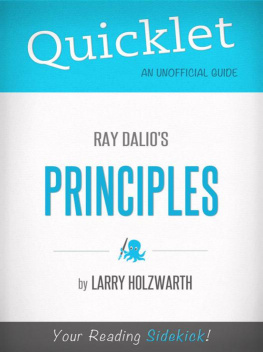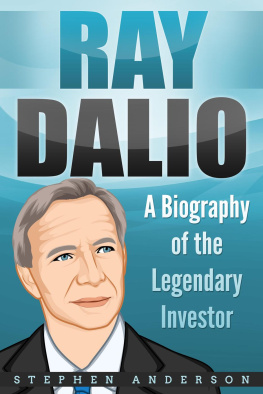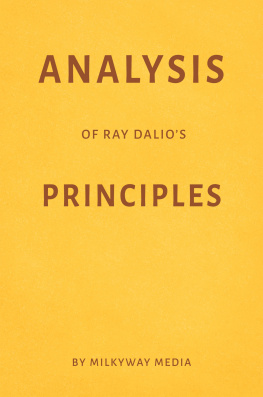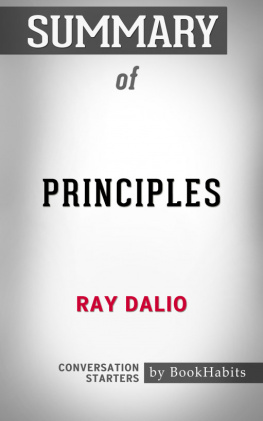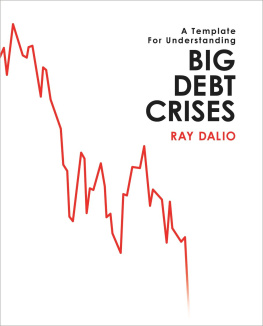Quicklet on Ray Dalio's Principles
I.
Quicklet on Ray Dalio's Principles
About the Book
Above all else I want you to think for yourselfto decide 1) what you want, 2) what is true and 3) what to do about it. I want you to do that in a clear-headed thoughtful way, so that you get what you want.
After being leaked to the press by a former employee, Ray Dalios Principles appeared on his company, Bridgewater Associates, website as a presentation of his management philosophy. It is required reading for all employees at Bridgewater. By his own admission, it is a dynamic document, subject to change as the tenets within are applied, discussed, and debated by Bridgewater employees.
Dalio explains that, the types of disagreements and mistakes that are typically discouraged elsewhere are expected at Bridgewater because they are the fuel for the learning that helps us maximize the utilization of our potential. Desiring an atmosphere of radical openness Dalio places a high value on independent thinking while recognizing that such thinking often generates disagreement and leads to mistakes.
The principles defined are a guide, both of life philosophy and business acumen. They have been freely available since appearing on Bridgewater Associates website, many other sites offer pdf copies for free download. The open availability of the book has made it the subject of debate in online communities as well as traditional media.
The book has drawn its share of criticism, being compared to Ayn Rand and called the Tao of Dal , amongst others. In response, Dalio has appeared on talk shows and chat rooms to explain his principles and how they apply to Bridgewater Associates.
Dalio describes Principles as three, distinct parts that can be read independently or as a connected whole. The first part defines the importance of principles, the second describes Dalios personal fundamental life principles and their importance to everything I do, and the third discusses his management principles. Dalio also mentions the desire to produce a fourth section describing his investment principles; although it would certainly be read with interest given his obvious success, it is as of this writing not available.
In its Preface, the book challenges the reader to approach Principles with an open mind and honest reflection upon the readers desires, intentions, and goals. If you cant do these things, you should reflect on why that is, because you probably have discovered one of your greatest impediments to getting what you want out of life.
Principles has also been cited as having a negative effect on employees as recently as March 2012, contributing to the excessively high turnover rate at Bridgewater Associates.
Introducing the Author
Ray Dalio was born in 1949, in the Jackson Heights neighborhood of Queens, New York. His father, a jazz musician, made his living playing in clubs throughout the New York area, his mother was a housewife. At the age of eight, Dalios parents relocated to Manhasset, on Long Island, where Dalio attended public school and earned money as a caddy at the Links Golf Club. The clubs membership included many Wall Street investors, not averse to sharing stock tips to the young man carrying their golf clubs.
With three hundred dollars, Dalio purchased shares of Northeastern airlines, the value of which tripled after a takeover shortly thereafter. By the time he entered college, Ray already had a portfolio worth several thousand dollars.
In college, inspired by The Beatles recently reported trip to India, he began practicing Transcendental Meditation . After completing college, and attending Harvard Business School, Dalio went to work at Shearson Hayden Stone, in the commodities futures department. An alcohol fueled confrontation with his boss, along with an incident at a client convention involving an exotic dancer on New Years Eve, 1974, got him fired. Some of his clients supported him however and he persuaded them to hire his new company, Bridgewater, which he operated out of his apartment.
By the late nineteen-eighties Bridgewater was managing employee retirement funds for clients as diverse as the World Bank and Kodak . By the second decade of the twenty-first century he was personally earning between two and three billion dollars a year and was listed as the 44th richest man on the Forbes 400 list.
Dalio is an avid outdoorsman, enjoying fishing and big game hunting from Canada to Africa. His company now employs over twelve hundred and has clients all over the world. Though he has been criticized for his management style, accused of running Bridgewater as a cult, he is unapologetic, saying, Ive been surprised that theres been so much controversy about us having such clearly set out principles.
Since writing Principles , Dalio has relinquished his title as CEO, preferring Mentor, while retaining his title as President of Bridgewater. In early 2012 he eclipsed George Soros as the worlds most successful hedge fund manager in terms of returns on investment to clients.
Overall Summary
Every game has principles that successful players master to achieve winning results.
Principles asserts that all organizations face the same challenges, their approach to resolving them is all that differs. The book describes a hierarchy of principles; management principles, hiring principles, parenting principles, et al, superseded by overarching life principles, which guide an individual in their approach to all things.
Under the guiding thesis that if one isnt getting what one wants out of life, out of work, or out of others the wrong principles are being applied, the book describes how to recognize and correct erroneous principles and their negative influence on events.
The book is divided into three sections, with a short introduction. The first section defines what principles are and their importance; the second presents the personal and fundamental principles of the author; the third describes the authors principles of management.
Dalio writes of his belief that the most valuable principles are those learned from experience, rather than those that are simply taught and accepted. Describing his own rise from a middle class background to his universally recognized prominence in financial circles, he presents his philosophy, his belief system, his reliance on meditation, and his personal system of values.
The functions of natural law and evolution are given precedence as a basis for the formation of principles. The role of the ego, as defined by Dalio rather than Sigmund Freud, is also considered.
The reader familiar with the works of Napoleon Hill will hear echoes of his voice in the text of Principles , in particular during discussion of goals and setting realistic timelines for their achievement. If one substitutes the word law for principles Ernest HolmesScience of the Mind, though not referenced or quoted, is nonetheless spiritually present in several sections of the text.
Likewise the words of Thoreau are heard in the background by those familiar to them.
Presenting his background and how his principles evolved in accordance with his values is the mainstay of Principles . In fact, one of Dalios fundamental principles, explained in part two, is I believe the desire to evolve, i.e., to get better, is probably humanitys most pervasive driving force. The explanation of the role his personal principles play in the management of Bridgewater Associates is secondary to the need for employees to understand and comply with the demands they present.

